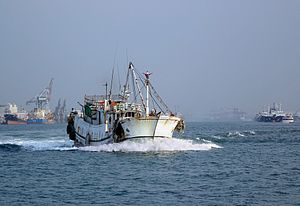Indonesia may consider sinking Chinese vessels that were caught illegally fishing in Indonesian waters, a foreign policy adviser to Indonesian president Joko “Jokowi” Widodo said Wednesday.
“We sank Vietnamese boats last week…maybe we will sink Chinese boats after that also,” Rizal Sukma, concurrently executive director of the Center for Strategic and International Studies think tank in Jakarta, told an audience during a book launch at the Indonesian embassy in Washington, D.C.
Rizal was referring to Indonesia’s decision to orchestrate a highly-public sinking of three empty Vietnamese vessels last Friday to deter illegal fishing, a practice that costs the country billions of dollars in lost revenue each year. The seizure of 22 Chinese fishing boats in Indonesian waters on Sunday has raised questions about whether the Jokowi administration will risk angering Beijing by sinking them as well.
Following the seizure, Maritime Affairs and Fisheries Minister Susi Pudjiastuti said earlier this week that she had made a formal appeal to Foreign Minister Retno Marsudi, who would then pass it on to the Chinese Embassy in Indonesia in what she termed “the persuasive route.” But she also said she was considering sinking the ships if Jokowi gave the green light.
China, for its part, is working with Indonesian officials to confirm details of the incident and has asked the Indonesian authorities “to ensure the safety and legal rights of Chinese crews and address this issue properly,” according to Chinese foreign ministry spokesman Hong Lei in a written statement to the Wall Street Journal.
For Jakarta, sinking the ships could risk straining the Sino-Indonesian relationship. China is Indonesia’s second largest trading partner, its top source of foreign tourists, and a growing investor, with both sides upgrading the relationship to a comprehensive strategic partnership during Chinese President Xi Jinping’s first visit to Jakarta last year.
The relationship has also gained further momentum over the past few weeks, with Indonesia joining and offering to host China’s new Asian Infrastructure Investment Bank and looking to boost tourism with Beijing. Jokowi and his advisers have also noted the close alignment between both countries’ key maritime concepts – China’s Maritime Silk Road and Indonesia’s Global Maritime Fulcrum.
Yet Indonesian officials have also remained firm on this issue thus far despite pleas from other countries. They consistently note that Indonesia’s 2009 Fishery Law permits monitoring officers and investigators to take measures against foreign vessels caught fishing illegally, including sinking them. Jokowi himself defended his decision on December 9 following complaints from other countries, saying he had asked his foreign minister to explain that it is “a purely criminal issue” and had “nothing to do with neighborly relations.”
Some in Indonesia have also argued that the Jokowi administration needs to be consistent in sinking foreign vessels regardless of the country involved in order for the policy to serve as an effective deterrent. Indonesian Defense University professor Salim Said said that the government “should not hold back on its stern action to ensure that the vessels “do not get a chance to return to Indonesian waters.”
Beyond China, Rizal also hinted that Indonesia may sink five Thai vessels in the coming days which have been held since they were captured in West Kalimantan in early November. Susi had said on Friday that Indonesia would sink even more foreign boats this week on December 14, but she had declined to disclose further details.
Indonesia is believed to have captured more than 150 foreign boats as of Tuesday this week. Jokowi has repeatedly said that around 5,000 ships – mostly from Thailand, Vietnam, the Philippines, Malaysia and China – operate illegally in Indonesian waters every day, and that the country suffers annual losses of over $20 billion dollars due to this practice.
































